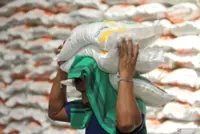
Prime Minister Hun Manet (left) shakes hands with Chinese President Xi Jinping in Beijing during an official visit to China last September. - Photo: Xinhua file
PHNOM PENH: Despite the long-standing ties between the Cambodian People's Party (CPP) and the Chinese Communist Party (CCP), the momentum in Cambodia-China relations appears to remain steady rather than advancing significantly, largely due to the shifting global political landscape.
Recent developments, particularly within the “Diamond Hexagon Cooperation Framework”, established in early 2023, show limited progress.
While both nations have reaffirmed their “ironclad friendship”, this cooperation, seen as a cornerstone of bilateral relations, requires further efforts to truly strengthen and expand mutual interests.
Concerns over US-Cambodia rapprochement
China is closely monitoring the recent warming of relations between Cambodia and the US with a mix of caution and concern.
According to a senior member of a well-known Cambodian think tank with expertise on Cambodia-China relations, who requested anonymity, Beijing is particularly wary of the potential for increased US influence in Cambodia, which could challenge China's long-standing partnership with the Kingdom.
“Their [China’s] concerns centre around the possibility of Cambodia’s new government shifting away from China and leaning toward the US,” he noted.
This apprehension has surfaced following a series of high-level engagements between the new Cambodian government under Prime Minister Hun Manet and key US officials, including Secretary of Defense Lloyd Austin and Assistant Secretary of State for East Asian and Pacific Affairs Daniel Kritenbrink, he added.
While China has not publicly voiced its concerns, diplomatic language from Beijing subtly reflects its unease.
The senior think tank member, who has extensive experience interacting with Chinese scholars and officials, suggested that China's emphasis on the "unchanging" nature of Cambodia-China ties serves as a quiet reminder to Phnom Penh not to stray from its established alliance.
Kin Phea, director of the Royal Academy of Cambodia’s International Relations Institute, echoed these observations, noting China's uncertainty about Cambodia's future foreign policy under the new leadership.
“China is suspicious and uncertain about the direction Cambodia might take,” he stated, adding that despite the continuity of the foreign policy framework, Beijing remains cautious. Several factors contribute to China’s apprehension.
Phea explained that the transition to Manet, who brings a different educational and leadership background, could introduce new perspectives.
Additionally, he suggested that the global geopolitical landscape, with rising US engagement and the emergence of mini-lateral mechanisms like AUKUS, QUAD, and the Indo-Pacific Strategy, poses challenges to China’s regional influence.
However, the strong political trust between Cambodian and Chinese leaders may mitigate these concerns.
One senior Cambodian official, who spoke anonymously, argued that mutual understanding at the leadership level could ease suspicions.
“I believe the Chinese leadership’s stance will remain consistent, and as long as the Cambodian People’s Party(CPP) governs Cambodia, China will not negatively impact or criticise Cambodia," he said.
Manet has repeatedly reiterated that Cambodia’s foreign policy will continue to align closely with past strategies, while making necessary adjustments to maximise national benefits.
Cambodia-China relations: Sustaining momentum amid change
Despite the evolving geopolitical environment and Cambodia's efforts to diversify its foreign relations, the Cambodia-China relationship remains robust, particularly in economic cooperation.
Under the leadership of Manet, with guidance from his father, former prime minister and current Senate president Hun Sen, the Kingdom’s foreign policy is expected to maintain its close alignment with China.
The core of Cambodia-China relations, especially in areas like infrastructure investment and economic projects, remains firm under Manet’s seventh-mandate government.
While Cambodia is reaching out to other global powers, particularly Western nations, this does not signify a major shift away from Beijing.
Instead, Cambodia aims to broaden its diplomatic and economic horizons, engaging with multiple partners to maximise its benefits.
This approach might result in subtle shifts in the pace or focus of cooperation with China, but is unlikely to alter the fundamental trajectory of their partnership.
At the core of this relationship is the Diamond Hexagon Cooperation Framework, which fosters comprehensive engagement across political, economic, and social domains, including innovation and technology exchanges.
This framework is seen as pivotal in ensuring the sustainability of Cambodia-China cooperation, even as Cambodia navigates broader regional and international dynamics.
Lim Heng, vice-president of the Cambodia Chamber of Commerce, emphasised the importance of the framework in boosting investor confidence, particularly among Chinese investors.
“The agreements established during Hun Sen's visits to China have been upheld under the current leadership, ensuring continuity,” he explained.
Uneven implementation progress
However, the implementation of this framework has been slower than anticipated.
The anonymous senior government official pointed out that while the framework contains many key components, its broad scope has resulted in unclear progress.
The Royal Academy’s Phea agreed, citing limited advancements in key areas like agriculture modernisation and industrial corridor development.
One contributing factor to the slow pace is China's current focus on domestic affairs in the post-Covid-19 era, which has led to reduced overseas funding, including for projects in Cambodia.
Despite these challenges, the underlying strength of Cambodia-China relations, particularly under the Diamond Hexagon Cooperation Framework, suggests that the partnership will remain a cornerstone of the Kingdom’s foreign policy for the foreseeable future.
As Manet’s new government continues to navigate the waters of foreign policy, maintaining a delicate balance between long-standing alliances and new partnerships, the Cambodia-China relationship will remain a critical factor.
While the framework offers a robust foundation for future collaboration, the speed and scope of its implementation will be a key indicator of the partnership's resilience.
Amid cautious optimism from both sides, it remains to be seen how China will adapt to Cambodia’s evolving political landscape, especially as Phnom Penh seeks to engage more actively with other global powers, including the US.
Ultimately, the trajectory of Cambodia-China relations will hinge on mutual trust and the strategic alignment of their national interests in an increasingly complex geopolitical environment. - The Phnom Penh Post/ANN
[Chandara Samban is a freelance journalist based in Cambodia with an interest in regional affairs, diplomacy and security issues. The opinions stated are his own.]










































